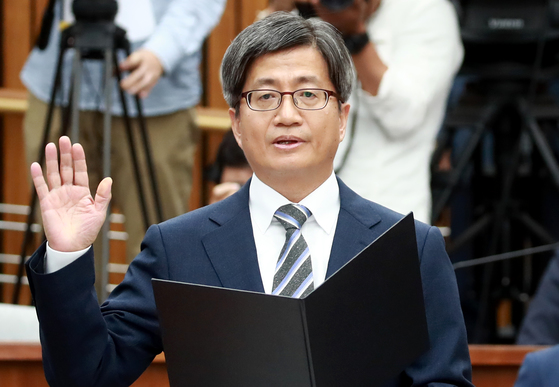When the Supreme Court Chief Kim Myung-soo, who is the center of the controversy over the’impeachment of the judge’, voted on the National Assembly appointment motion in September 2017, it was revealed that he mobilized all of his junior judges to lobby the opposition party lawmakers with a vote. Judge Lim Seong-geun, head of the Busan High Court, also previously told the JoongAng Ilbo, “I asked not only the lawmakers I had known, but also the seniors of the high school after receiving the request of Chief Justice Kim two days before the vote.”
Supreme Court Chairman Kim’s appointment motion was passed at the plenary session on September 21 of that year with 160 votes (53.7%) in favor of the 289 present. Among the Supreme Court Chiefs of all time, the approval rate was the lowest.
Even the pro-Park Gye lawmakers… “Look at us, please agree with Kim Myung-soo”

Candidate Kim Myung-soo is taking an oath at a personnel hearing held in the then National Assembly on September 12, 2017.
Former Liberal Korean Party lawmaker Jeong Gap-yoon, who is classified as pro-Park Geun-hye, told the JoongAng Ilbo on the 7th, “A few days ahead of the vote of Supreme Court Chief Kim Myung-soo. I received a phone call from Seong-geun Lim and Chief Justice of the Seoul High Court at the time, and Lee Min-geol, head of the Planning and Coordination Office of the Court Administration Department.” Rep. Chung was a member of the National Assembly Legislative Judicial Committee in September 2017.
Rep. Chung said, “At the time, Supreme Court Chief Kim Myung-soo had never taken a leader class as Chief Justice of the Chuncheon District Court, and there were concerns about his qualities.” “(Judge Im, etc.) said,’If you look at us, please (approve)’”Said. He said, “The judges of the administrative department went back and forth to the National Assembly and made a lot of friendships with the lawmakers. A situation in which the passing of the vote could have been dangerous without such efforts”Added.
“Come to the Judge of the Administration Office… I didn’t even know if it was Kim Myung-soo’s request.”
Likewise, former Liberal Korean Party lawmaker Yeo Sang-gyu, who was a member of the Judiciary Committee, “I was told to vote for approval (from a judge in the administration office) ahead of the approval vote.”Said. “It’s old, so I don’t remember who exactly did it,” he said, “but there were often times when judges from the administration came to the office.”
“At that time, I didn’t know if the Supreme Court had asked for it, and since candidate Kim was nominated, it was evaluated as an unexpected person. In addition, with the history of the president of the Korean Law Research Association (evaluated by the propensity to progress), he said it was close to non-mainstream at the time. Several other opposition lawmakers are also known to have received phone calls from judges including Senior Judge Lim Seong-geun.
“Instructing the judge to ask for a vote of the National Assembly member? Intellectual abuse”
![Supreme Court Chief Kim Myung-soo's approval proposal was eventually passed by the National Assembly. On September 25, 2017, President Moon Jae-in confers a letter of appointment to Chief Justice Kim at the Blue House. [연합뉴스]](https://i0.wp.com/pds.joins.com/news/component/htmlphoto_mmdata/202102/08/f114cd20-678d-4e93-8a4e-5ea9ad19d9bc.jpg?w=560&ssl=1)
Supreme Court Chief Kim Myung-soo’s approval proposal was eventually passed by the National Assembly. On September 25, 2017, President Moon Jae-in confers a letter of appointment to Chief Justice Kim at the Blue House. [연합뉴스]
At the time of Supreme Court Chief Kim Myung-soo, whether or not the approval was passed was even immediately before the vote on September 21, 2017. This is because the opposition parties, the Liberal Korean Party and the Barun Party, adopted the’opposite party argument’ at the last minute and expressed their intention to reject it. The result was 160 votes in favor, 134 votes against, and 1 abstention, which exceeded 10 votes in the majority (150) of the 298 attendees at the time. Excluding 130 votes from the ruling party at the time, the opposition party voted in favor of about 30 people.
Some point out that there is a potential for ex officio abuse of the use of judges, including judges belonging to the court administration office just before the vote of the Supreme Court’s approval bill, in the lobby of the affirmation vote. Article 49 of the Court Organization Act prohibits judges from being’involved in political movements’, and that Supreme Court chief Kim abused his authority by letting junior judges engage in a political act called lobbying for his approval.
One judge said, “If the nominee of the Supreme Court does not oblige the judges of the administrative department who handle administrative affairs, it seems likely to be abusive of authority.” The act of asking opposition lawmakers to vote in favor of the vote for the appointment motion itself is not appropriate,” he said.
Reporter Dr. Ra [email protected]
